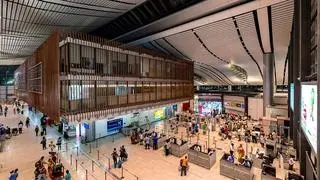Local ship owners looking to grab charter contracts of more than five years from state-run oil firms are staring at the uncertainty and cost implications arising from a new global rule on using low sulphur content fuel oil.
Beginning January 1, 2020, ships must use fuel oil on board with a sulphur content of not more than 0.5 per cent m/m (mass/mass), a steep cut from the current global sulphur cap of 3.5 per cent m/m. Ships can meet the requirement by using low-sulphur compliant fuel oil or continue to use high sulphur fuel oil by fitting exhaust gas cleaning systems or scrubbers.
Local oil refiners have said it is not possible to produce low sulphur fuel oil by January 1, 2020.
Indian Oil Corporation Ltd (IOCL) and Bharat Petroleum Corporation Ltd (BPCL), are looking to hire a very large crude carrier (VLCC) and a Suezmax carrier, respectively, for as much as seven years from local fleet owners in the first such long-term cargo support policy to be tried out in India.
Ships hired for the contracts will have to comply with the low sulphur regulations mandated by the International Maritime Organization (IMO) from 2020 and “any modification/retrofitting required on the vessel to be carried out by vessel owner at their cost and time”, according to the tender issued by the state-run refiners.
Fitting scrubbers costs anywhere between $3 million and $8 million depending on the size of the ship is an additional cost to the owner, said a shipping industry consultant.
The new IMO rule on low sulphur cap poses significant challenges to oil refiners and on the economics of shipping — compliant fuel is expected to cost between 50 and 100 per cent more than the fuel oil that most ships currently burn.
In time charter contracts such as those of IOCL and BPCL, the charterer has to pay/reimburse voyage-related costs such as bunker and port charges to the ship owner. The tender stipulates that IOCL and BPCL will only reimburse the cost of intermediate fuel oil (IFO) 380 centistokes (CST) having a sulphur content of 3.5 per cent m/m.
“Either the ship owners will have to put scrubbers to continue using high sulphur content fuel oil or use fuel oil of 0.5 per cent m/m sulphur content which costs as much as $200 per tonne more than the 380 CST used by ships currently,” the shipping industry consultant said.
Extra costs
Bunker costs account for as much as 45 per cent of the voyage/operating cost of a ship and any increase in fuel oil consumption per day would entail huge extra costs.
For a VLCC, 1-2 tonnes more of fuel oil consumption per day, makes a big difference. A VLCC typically burns about 70-75 tonnes of fuel oil a day. Fuel oil of 3.5m/m sulphur content is available in India and currently costs about $350-400 a tonne. Extra consumption of 2 tonnes per day means additional cost of about $700-800 per day.
But, low sulphur fuel oil — it will not be available in India by 2020 — costs about $550-600 a tonne. If the VLCC consumes 2 tonnes more per day, the extra costs would be about $1,100-1,200 per day.
Further, the owners will have to spend more on operating costs, mainly port charges, to lift bunker from foreign ports as low sulphur fuel oil will not be available in India.
Both, IOCL and BPCL, would feel the impact of such extra costs because it would have to reimburse the port costs to the ship owner. Besides, with IOCL and BPCL permitting ships to use high sulphur fuel oil after fitting scrubbers, there is no incentive for local oil refiners to adopt the technology to produce low sulphur content bunker, the industry official said.
IOCL and BPCL would have benefitted from producing low sulphur fuel oil because they can supply it at cost price and not market price to the time charter contracts as it is for internal consumption.







Comments
Comments have to be in English, and in full sentences. They cannot be abusive or personal. Please abide by our community guidelines for posting your comments.
We have migrated to a new commenting platform. If you are already a registered user of TheHindu Businessline and logged in, you may continue to engage with our articles. If you do not have an account please register and login to post comments. Users can access their older comments by logging into their accounts on Vuukle.